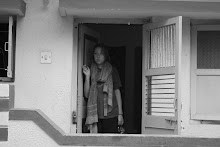We walk down her village’s dirt road. It’s lined on each side by concrete huts connected in a row like rustic Legos. I gaze through doorways and windows, catching moments that slow down time – a man hunched over a loom weaving shawls, a woman crouched over a fire making roti (the Indian tortilla), a goat tied to a make-shift fence, kids playing in the dirt with sticks and tires…
We are sitting in a circle.
On the floor of Rajjiben’s village home.
A simple, one-room hut with the dimensions of a queen bed. Not that there’s any space, money, or real need for furniture.
The number of kids sitting with us increases with each minute I’m there. I conjure up every last word of Gujarati I know to communicate and interact. But not before I spend a few surreptitious minutes listening in on what they’re saying about me. How white my skin; how light my hair. When they discover I can speak their language I might as well have brought them a toy store.
After my friend and host Rajjiben, a weaver working with KHAMIR, comments on my earrings, I’ve spent enough time in Kachchh that I immediately want to offer them to her. She refuses even though I emphatically insist (see Open Arms). But then she’s telling me in Gujarati that her husband is gone. I had forgotten that it goes against custom for widows to wear jewelry. Instead I take off my earrings and hand them to one of her daughters. Grinning, she puts them in her ears and steps over little kids to strut around the room, not minding how out of place the earrings seem to be with her traditional clothes. We laugh. She’s then shuffling through their closet space, the plastic bags in a corner. She comes out with earrings and puts them in my hand. Then, to my growing dismay, another girl finds her own pair and gives them to me. I want to refuse any of their so few possessions, but I know that I have to accept. I wear one of each pair and tell them they’re beautiful.
More neighbors come pouring in. Did I mention the house was about ten feet by seven feet? I understand them telling each other who I am, why I’m here, how bad I am at Jacks. They tease me for not having a husband, but insist they’ll find me one so I can have a house here with them in their village. A rustic Lego next door.
As we all sit together, chai and contentment are being passed around and shared.
Milk is boiling.
Kids are laughing.
There’s nothing really to do.
Which somehow is fantastic. We’re left to enjoy each other’s company in the simplest form.
I know that I’ll never be the same. The realization rammed into me while time was slowing down. But I can’t exactly explain why the recognition arose. Reflecting on it now, it probably has to do with what I’ve gained through exposure to worlds so different from my home. A new awareness.
Of how little we really need in life
And what it actually means to need.
They’re asking me to stay for dinner and spend the night in their home. This warm generosity takes my mind for a wander again. If the situation was reversed, would I have been as willing to share my possessions, my time, my world?
As my act in Kachchh approaches its finale, I think about Legos, Jacks, and sharing. And about how of all the contagious things going around here, it’s the graciousness of people that is the most catching.
